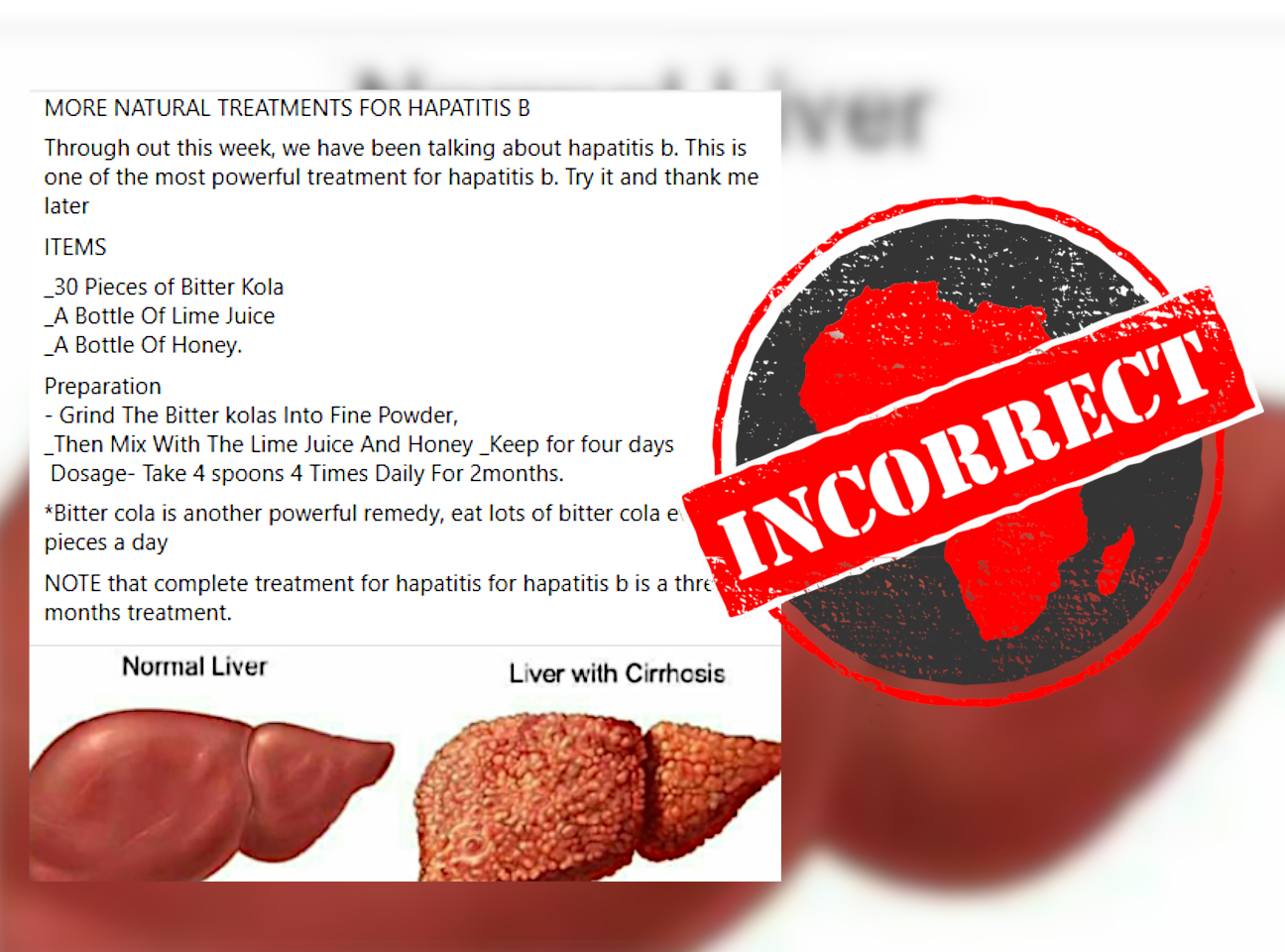A mixture of bitter kola, lime juice and honey is a “powerful treatment for hepatitis B”, claims a Facebook post shared in Nigeria in November 2020.
It reads: “Grind the bitter kolas into fine powder, then mix with the lime juice and honey. Keep for four days. Take 4 spoons 4 times daily for 2months.”
Hepatitis B, a liver infection that affects people of all ages, is caused by the hepatitis B virus, according to the US Centers for Disease Control and Prevention.
People can be infected through contact with the blood, semen or other body fluids of an infected person. The disease is preventable, with effective and safe vaccines available. Hepatitis B infection can be either acute or chronic, and each requires a different kind of treatment.
The World Health Organization recommends that all infants should be given their first dose of the hepatitis B vaccine within the first 24 hours of birth. To complete the primary vaccination series, they should receive another two to three doses after that.
But will a bitter kola, lime juice and honey cure hepatitis B? We checked.

Emmanuel Ekanem, a specialist in gastroenterology and hepatology and professor of paediatrics at Nigeria’s University of Calabar, told Africa Check there was no scientific evidence that the mixture treated hepatitis B.
He said treating the various forms of hepatitis B infection required specific care regimens.
“At some stages, you do not need to interfere with drugs, while some will require drugs. There are standard drugs for these and clear indications of when to deploy these drugs,” he said.
Claims shared online encourage people to consume all kinds of mixtures to treat hepatitis B, Ekanem said. These may cause patients to abandon their prescribed medicine, only to return to the hospital with more severe symptoms.
Ekanem said people with hepatitis B should be careful of taking alternative remedies as these could further damage the liver and lead to complications affecting other organs, such as the kidney.
“People who suspect they might have this infection should visit a specialist who can do a test, confirm if they are infected, determine their viral load, and tailor their treatment according to the stage of the infection,” he said. – Catherine Olorunfemi
It reads: “Grind the bitter kolas into fine powder, then mix with the lime juice and honey. Keep for four days. Take 4 spoons 4 times daily for 2months.”
Hepatitis B, a liver infection that affects people of all ages, is caused by the hepatitis B virus, according to the US Centers for Disease Control and Prevention.
People can be infected through contact with the blood, semen or other body fluids of an infected person. The disease is preventable, with effective and safe vaccines available. Hepatitis B infection can be either acute or chronic, and each requires a different kind of treatment.
The World Health Organization recommends that all infants should be given their first dose of the hepatitis B vaccine within the first 24 hours of birth. To complete the primary vaccination series, they should receive another two to three doses after that.
But will a bitter kola, lime juice and honey cure hepatitis B? We checked.

Some alternative remedies could do more damage to liver
Emmanuel Ekanem, a specialist in gastroenterology and hepatology and professor of paediatrics at Nigeria’s University of Calabar, told Africa Check there was no scientific evidence that the mixture treated hepatitis B.
He said treating the various forms of hepatitis B infection required specific care regimens.
“At some stages, you do not need to interfere with drugs, while some will require drugs. There are standard drugs for these and clear indications of when to deploy these drugs,” he said.
Claims shared online encourage people to consume all kinds of mixtures to treat hepatitis B, Ekanem said. These may cause patients to abandon their prescribed medicine, only to return to the hospital with more severe symptoms.
Ekanem said people with hepatitis B should be careful of taking alternative remedies as these could further damage the liver and lead to complications affecting other organs, such as the kidney.
“People who suspect they might have this infection should visit a specialist who can do a test, confirm if they are infected, determine their viral load, and tailor their treatment according to the stage of the infection,” he said. – Catherine Olorunfemi
Republish our content for free
For publishers: what to do if your post is rated false
A fact-checker has rated your Facebook or Instagram post as “false”, “altered”, “partly false” or “missing context”. This could have serious consequences. What do you do?
Click on our guide for the steps you should follow.
Publishers guideAfrica Check teams up with Facebook
Africa Check is a partner in Meta's third-party fact-checking programme to help stop the spread of false information on social media.
The content we rate as “false” will be downgraded on Facebook and Instagram. This means fewer people will see it.
You can also help identify false information on Facebook. This guide explains how.





Add new comment